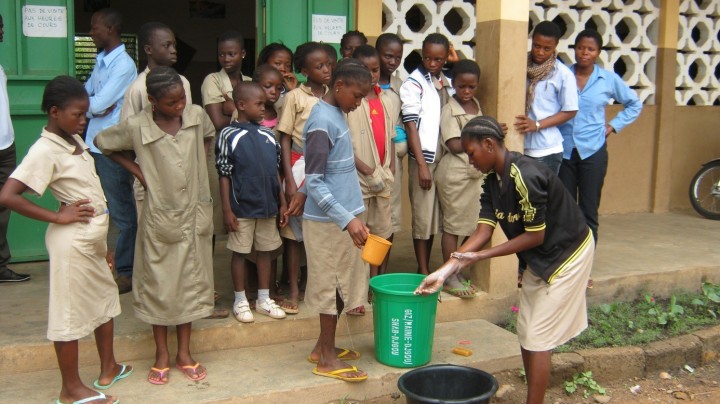Water and sanitation activities of GIZ in Benin The urban and rural population in general and particularly the population living in the peripheral areas of the municipalities uses the affordable provision of water and sanitation under consideration of relevant hygienic standards.
Deutsche Gesellschaft für Internationale Zusammenarbeit (GIZ) GmbH
GIZ
In recent years the technical and financial cooperation between Benin and Germany and other partners have improved urban water supply. 85% of the population have now access to hygienically clean drinking water. On the other hand more than 30% of the population (1.8 million people) living in rural areas still lack access to safe drinking water.
Specific successful activities on sanitation in rural areas:
• Promotion of a test that allows the households themselves to test the quality of their drinking water and thus facilitates behavioral change
• Automatic chlorination of drinking water. As of July 2018 592 628 beneficiaries. Further chlorination systems are being established.
• Health Education conducted in 168 primary schools of 10 municipalites in combination with the establishment of separate latrines for boys and girls
Further activities concentrate on strategies and policies. Benin has established policies and strategies like the national policy on sanitation and hygiene (2013), the national strategy for rural sanitation and hygiene (2014), the national strategy on waste water management in urban areas (2007) and the national strategy to monitor the quality of the drinking water (2012). Several of these papers need updating to be in line with SDGs and recent institutional reforms. The GIZ supports these reforms and contributes to the revision of the documents with special emphasis on the quality of drinking water, behavioral change, gender aspects and the effects of climate change.

Mission
The specific objective of the joint program implemented by GIZ and KfW is as follows: The urban and rural population in general and particularly the population living in the peripheral areas of the municipalities uses the affordable provision of water and sanitation under consideration of relevant hygienic standards. Specific objectives on sanitation: • 60% of samples taken from public taps and water basins in the households are free from fecal coliforms • 50.000 persons have access to drinking water without fecal coliforms • 700000 residents of 38 municipalities with at least 50% of the residents living below the poverty line have access to a reliable water supply in terms of both quantity and qualityResults
- Sector coordination is ensured at national and departmental level. - Water quality is controlled for 80% of the piped water systems in rural areas. - 160 primary schools of 8 communities have latrines/toilets with separate stances for boys and girls. - The sector action plans for hygiene and sanitation of 8 communities take the specific needs of women, men, handicapped and poor people into account. -The communities apply the sectorial planning for hygiene and sanitation.Further comments
Online after Giz country programme's approval - Shobana, updated by AinulExternal Website(s)
https://www.giz.de/en/worldwide/18987.html
Answer questions about the project
Helga Fink
helga.fink@giz.de
Filter / Tags
Rural areasBehaviour changePolitical processes and institutional aspectsCities (WG6)Sustainable WASH in institutions and gender equality (WG7)Public awareness, advocacy and civil society engagement (WG9)German governmentSchools
Related Countries
Benin

Project location
